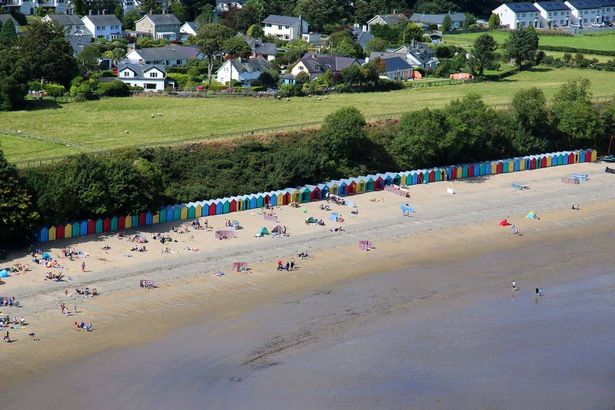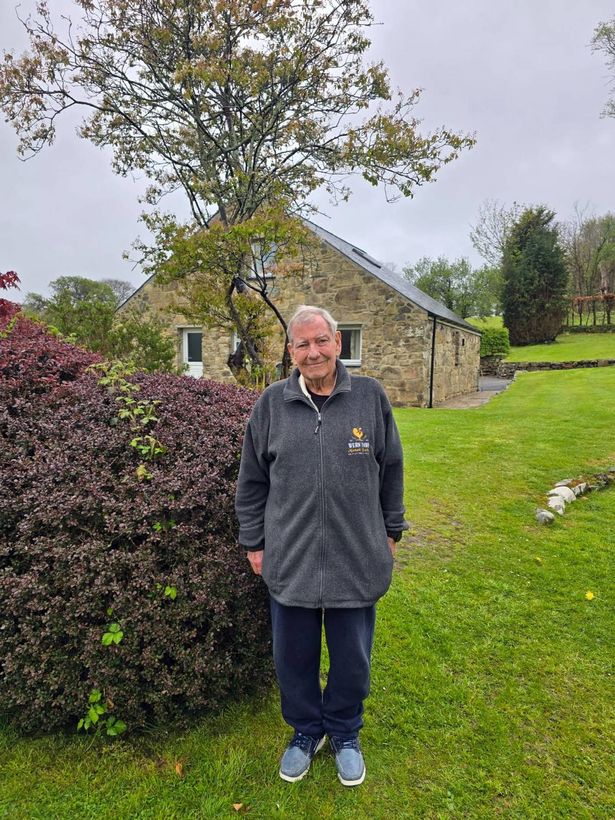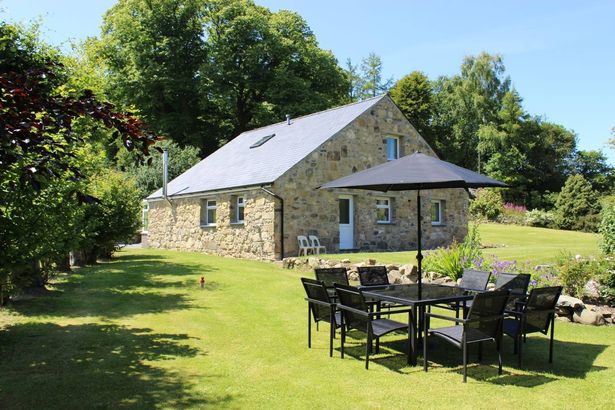Homeowners in some parts of the UK are facing a ‘living hell’ as house prices tumble and properties fail to sell due to anti-tourism measures and a ‘hellish’ climate An Adra housing development in Gwynedd
An Adra housing development in Gwynedd
Alan Harper-Smith’s venture into the property market began with him saving for a deposit on a two-bedroom flat beside a railway, in what he delicately terms a “down-at-heel” neighbourhood. Now aged 67, he finds himself the owner of an expansive ex-farm in Gwynedd.
Yet, rather than feeling satisfied, he, along with many other local homeowners, feels cornered. A resident of the Llŷn Peninsula for nearly three decades, Alan was not looking for a change. He loves the area and three of his four children still live at home.
His farm includes five 16th-century cottages transformed into holiday rentals, and his farmhouse runs as a B&B, enticing visitors with the promise of locally sourced smoked kippers. Until recently, life seemed fairly ideal. For our free daily briefing on the biggest issues facing the nation, sign up to the Wales Matters newsletter here
At the moment though, a barrage of daunting regulations targeting property and tourism is pressuring him to consider other paths – including the possibility of relocation. Sharing his thoughts, Alan expressed: “To be honest, we are thinking of selling up with all the restrictions coming in the pipeline and the destruction of tourism in Wales. It will be a massive reduction in price for me, but probably worth it from a mental health point of view for both my wife and I. It is driving me bonkers and my health is suffering.”, reports North Wales Live.
 Beach huts on Traeth Llanbedrog(Image: Steve Daniels/Wiki)
Beach huts on Traeth Llanbedrog(Image: Steve Daniels/Wiki)
The property market in Gwynedd has experienced a downturn, leaving sellers like Alan facing tough decisions as their homes lose value. He remarked, “No one would sell a £500,000 house for £50,000,” expressing his frustration.
With no choice but to look for other options, he is considering decommissioning his cottages by removing kitchens and bathrooms and transforming them into business premises.
This dilemma isn’t unique to Alan – residents across North Wales have turned to online forums to voice their distress about the stagnant housing market, even after slashing prices. The properties range from secondary holiday homes to primary residences.
A woman from Gwynedd shared her story, noting: “18 months prior, her family’s sea-and-mountain-view bungalow was quickly snapped up, only to be taken off the market due to health issues. Now, despite its improved condition. In one month, not one viewing.”
Over in Conwy, a couple on pension and owners of a second home are feeling pressured to sell as they face a council tax increase to £9,666 this year, compared to £3,866 if it were their main residence. After two years of unsuccessful attempts to sell, the husband confessed: “I am feeling sick and worried.
“My Welsh-born father and grandparents would be turning in their graves if they knew.”
A 76 year old Pen Llŷn resident has also expressed regret over her property purchase due to unforeseen complications. She said: “Had I known back in 2017 when we first exchanged contacts with the builder that there were so many problems ahead, we would have never purchased in Wales.
“I understand your grief,” and shared the distress of being unable to sell her home to be closer to her family.”
Owners of holiday lets are facing a ‘hideous’ catch due to stringent new regulations.
Holiday homes are now subject to significant council tax increases and, unless they adhere to tough new rental quotas, self-accommodation providers will also bear the brunt. Amid fears of harsh taxation, reports suggest a surge in sales as holiday let owners attempt to offload their properties, leading to a swell of cottages entering the market.
Nicky Williamson from PASC Cymru, however, warns of a different, more insidious issue plaguing accommodation providers — an unexpected loophole in the Valuation Office’s assessment system that could see them hit with massive bills amounting to tens of thousands of pounds.
Since April 2023, holiday lets must fulfil an annual letting requirement of 182 days to qualify for reduced business rates. Those who fall short face increased council taxes which, in some counties, are exacerbated by steep premiums.
Yet, there’s a snag: even those who have fulfilled the 182 days-a-year letting requirement since April 2023 have encountered an unwelcome shock. Nicky explained: “People are getting massive bills landing on their doorsteps,” and elaborated, “They’re now being penalised for not meeting the threshold in 2022-23 when legally they didn’t have to – and they didn’t know they had to.
“In the past two days I’ve had seven calls about this from people who are desperate. For a lot of people it’s come as a shock. A farming family recently received a £37,000 bill. The owner of a five-bedroom let had a demand for £27,000, to be paid immediately. This was despite meeting the 182-day target for the past two years.”
She pinpointed the issue to the Valuation Office’s approach of calculating letting rates over a three-year span. Consequently, liability assessments are based on the year when the 182-day rule wasn’t mandatory – and many holiday lets in 2022-23 didn’t reach this benchmark.
The resulting council tax premium is then retroactively imposed across all three years, leading to staggering bills that proprietors struggle to settle.
Although refunds are theoretically available for years post-2023 where the 182-day criterion was achieved, Nicky highlighted a significant delay: “But there’s a huge backlog,” she said.
She knows of a case where a refund claim initiated last July is still pending. Meanwhile, numerous individuals are ignoring the problem, accruing more debt.
With many unable to afford the immediate payments, they are left uncertain about how to proceed.
The surge in holiday let sales, Nicky says is further amplified by the current downturn in the housing market.
Even with significant price reductions, selling these properties is challenging.
In Gwynedd, the situation is partly constrained by Article 4, a legislation demanding planning permission for non-primary residences.
Property owners in the region, particularly those with holiday homes and lets, are feeling the pressure.
Nicky said: “It’s become a living hell for many people. They feel completely trapped in a situation beyond their control.
“Take pensioners who invested in a holiday let next to their homes to supplement their retirement – they can no longer afford to stay there, yet they cannot move. It’s a hideous situation.”
The implementation of Article 4 in Gwynedd has seen a mixed reception; it was well-received within communities grappling with escalating property prices, but there is still an ongoing legal contention. The Eryri National Park is set to follow suit and enforce Article 4 on June 1, amidst concerns that locals are being ousted from their communities, threatening both cultural and linguistic ties.
Research conducted by Cyngor Gwynedd indicates that 65% of the county’s populace is financially barred from the housing market. The council’s aspiration is to facilitate sustainable communities by providing a diverse range of housing options tailored to meet local requirements.
With thousands waiting for social housing, the authority aims to construct 700 new homes, including 361 affordable units scheduled for next year.
Campaigners are calling for more influence over the conversion of properties into Airbnbs, but above all, people are seeking a home. An online commenter described this as a “basic human right… that gives them some dignity”.
Article 4 and related measures, such as the 182-day rule and hiking council tax for second homeowners, are already making waves. Property values in Gwynedd saw a sharp decrease of 12.4% within the year leading to December 2024 — the steepest decline across any local authority region in Wales, as reported by the Principality Building Society.
The goal has always been to rein in property price surges. Yet, in Pembrokeshire, there’s concern that the intervention might be too aggressive.
With a 200% premium on second homes causing a slump in the housing market, leading to an 8.9% drop in prices last year, the county council recently reduced the premium to 150%.
This situation has put sellers across the board in a bind. Pensioners aiming to downsize are forced to cut asking prices, much like holiday let owners and second home proprietors who can’t keep up with the tax premiums.
In this sluggish market, finalising sales is increasingly difficult, particularly for high-end properties. Online comments from vexed sellers in Gwynedd mirror this frustration. One person said: “I am second home owner trying to get out, for one year now.
“It’s not happening, agents just want you to keep dropping the price. I am in the red against what I paid for my house.”
Critics are pointing fingers at the lack of new homes being built as the core issue behind the housing crisis in parts of Wales. In the last quarter of 2024, a mere 760 new homes were initiated in Wales, marking a 59% decrease from the same period in 2023 and recording as the second lowest quarterly figure in ten years.
The Welsh Government is facing allegations of orchestrating a “self-made” housing crisis.
The situation is particularly grim for first-time homebuyers, with housing becoming pricier: in Wales, the Land Tax threshold stands at £225,000, whereas in England it has been raised to £300,000.
At the same time, social media is littered with claims of affordable property in places like Gwynedd. Some grate with their scorn. Here’s an example. “Right now, this second… 83 houses under 170k within 10 miles of Nefyn. Eighty f***ing three! What planet are these clowns on, are they actually too useless to use the search on Rightmove?”
 (Image: Wern Fawr Manor Farm)
(Image: Wern Fawr Manor Farm)
In Llanbedrog, like many other places in Wales, Alan Harper-Smith’s holiday let business at Wern Fawr Manor Farm teeters on the brink. Despite meeting the Welsh Government’s 182-day letting requirement, maintaining this standard is challenging, and any misstep could spell disaster: if all five properties fall short of the target, he would face council taxes with an additional 150% premium instead of business rates.
Alan calculates that his costs would skyrocket from £9,000 to £44,000 annually. He said: “The business would be totally unviable.
“One cottage sleeps 10 and is pitched at families who come in summer and perhaps at Easter, as well as 80th birthday celebrations,” he explained. “How the hell are we going to be able to keep filling this cottage for 182 days each year?”
But his grievances extend far beyond that. He’s particularly irked by Article 4 and a UK government proposal to overhaul the Energy Performance Certificates (EPC) system, which could affect holiday homes.
Add to that the impending tourist tax in Wales and more.
 (Image: Wern Fawr Manor Farm)
(Image: Wern Fawr Manor Farm)
Like many traditional holiday home owners, Alan feels there’s an unfairness in how different types of accommodation businesses are treated. He points out that operations like seasonal static caravans, lodge parks, and glamping sites don’t face council tax and believes they’re getting off lightly.
“Static caravans like the ones in Haulfryn’s Warren should be paying 150% council tax per van,” he argued. “Like us, they should also have to comply with EPC regulations, meet the 182-day rule, conform to commercial waste conditions and so on.”
Despite his frustrations, Alan isn’t keen on selling. “I’ve re-invested every penny I’ve earned over the last 28 years into the old cottages, using local people,” he shared.
“We bring a lot of people into the area, charging prices well below the astronomical fees levied by Airbnbs. We’ve had people coming here regularly for 15 years.”
He laments the government’s approach, saying, “Now we’re seeing the government kicking us in the nuts. I wouldn’t mind so much but the money is not being ring-fenced for the visitor economy.
“Many people have given up already and are putting their properties on the market. These are people who have been here years and years supporting their local communities. But it’s becoming harder because there’s a growing sense among visitors that these communities are becoming anti-tourist.”
In search of answers, he took to the internet with a query: “If I take the kitchens out of the cottages (oven and hob), can I change these cottages into storage units, which will reduce council tax dramatically? And tourists can stay in tents!”.
The idea of converting holiday homes into different types of property to escape council tax hikes is a hot topic among concerned proprietors. Nicky Williamson from PASC Cymru understands the rationale.
“People are desperate and are panicking, so they’re looking for any angle they can,” she commented. “I hear a lot of owners talking about stripping out their properties to create offices or industrial units.”
Yet, she is aware of only one individual who has completely stripped their holiday let to dodge taxes, located in Cardigan. Nicky remarked: “It’s not really feasible for most people. Besides, why would you want to do it? You’ve invested a lot of money in your holiday let, and then on its maintenance, only to turn it into an empty property. It’s doesn’t really make sense.”
In Gwynedd, unfurnished vacant properties are exempt from council tax premiums for six months, after which a premium is due. For those seeking to avoid this, listing their property for sale or rent provides a year’s respite from premiums.
Now settled in Llanbedrog, Alan isn’t quite ready to throw in the towel. After consulting with the Valuation Office, he’s considering converting his holiday cottages into office rentals.
“I would only need to replace beds and settees with desks!” he quipped.
“Rates would be negligible and payable by the tenant renting the unit. It removes five cottages from what the Senedd call the “housing stock” although my property was bought freehold and does not belong to them.
“If I could get fibre to the properties, perhaps people could use them for hot-desking. It’s something I’m seriously thinking about – I just need to persuade my team.”
